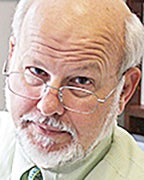Doc’s advice: Time to opt into Medicaid expansion
Published 12:00 pm Tuesday, August 23, 2016

- Charlie Mitchell
During the past two-and-a-half years, dozens of factual studies and reports have accumulated from states that expanded Medicaid as part of Obamacare.
Perhaps in light of these reports, Mississippi physicians weighed in last week, adopting a resolution suggesting Mississippi — which took a pass — would do well to sign on.
Gov. Phil Bryant says no. He said in 2014 that expansion would bankrupt the state. His position hasn’t changed (although the state appears to be flirting with bankruptcy anyway).
So Mississippi will ignore the Mississippi State Medical Association and hold fast with 18 other states that rejected the federal offer that came with billions of health-care dollars.
The core reason for the rejection is that Bryant and the state’s leadership believe in their heart of hearts that government already does enough for people and that people need to do more for themselves. They didn’t invent this notion, but it is evident every decision they make. (Footnote: Corporations aren’t people — so it’s OK to give them everything they desire.)
The counter argument to bedrock conservatism that doing things for people is what government does, period. Cost-sharing is fundamental in a democratic society. We share the cost of national defense, Interstate highways, White House utilities and kibble for police dogs. The issue with the Affordable Care act is whether and how to share the nation’s collective medical bill.
Speaking of that bill, it is been paid four ways: Medicare, which is federally funded completely but reserved for old folks; private insurance; cash; and Medicaid, funded from federal and state treasuries but reserved for the truly poor and disabled. State shares are calculated on ability-to-pay. Mississippi, the poorest state, gets the largest match.
The Medicaid expansion Congress approved as part of the ACA package was not and is not — despite spin and rhetoric — about offering another handout to lazy, shiftless people (as many regard Medicaid). It was and is to cover people with jobs that don’t provide health insurance or don’t pay enough for the people to buy coverage in the private market. Repeat: The expansion’s target is working people, not grifters.
To that end, the studies say, is has done more good than bad.
The mostly neutral Kaiser Family Foundation collects the reports and indexes them on its website.
Our neighbors Louisiana and Arkansas opted in. There, individuals earning up to $15,000 and families earning up to $32,000 annually (138 percent of the official poverty level) have become eligible for Medicaid.
Some study highlights:
• In Kentucky, expansion resulted in 12,000 jobs in 2014, 5,400 of them in health care. There was also a $1.3 billion reduction in unpaid medical bills.
• Average household income in Colorado is up $643 due to economic stimulation resulting from the expansion.
• Nationally, there’s been no labor market effect, meaning people didn’t quit jobs to get free stuff.
• Arkansas emergency rooms saw a 46.5 percent reduction in visits by uninsured people and outpatient visits by uninsureds dropped 36 percent.
There’s a lot more.
In the expansion’s initial years, the federal treasury was tapped for 100 percent of the cost. Eventually (now) states must kick in matching funds. It’s this match from the Mississippi treasury that Bryant says the state can’t cover. That’s been a concern in other states, too. A valid one. But note that one study shows “regardless of how (Arkansas) chooses to fund its share of the expansion costs starting in 2017, the state will see positive economic growth into the future.” (More paying customers means more jobs means fewer write-offs and more income, which means more taxes to cover the cost of the match.)
In today’s world people become adamant. One camp insists Obamacare is a miracle. The other say it’s the work of Satan. The truth, and even the president has said this all along, is that it’s far from the do-all to end-all.
Health care in America is excellent. Health care in America is full of crooks and charlatans. Health care in America saves lives. Health care in America is wasteful, riddled with fraud and costs way, way too much. Health Care in America is the best in the world. Each and every one of those statements can be supported.
To be answered is whether we leave it at that or keep trying to find a better way. Thirty months into this deal, Mississippi’s doctors say expanding Medicaid is, on balance, the best strategy for now.
Doctors are pretty close to the situation, you know. Too bad official Mississippi isn’t interested in taking their advice.
Charlie Mitchell is a Mississippi journalist.





